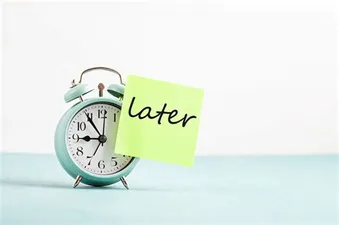


The first response that comes to mind is that procrastination is bad. Procrastination is the habit of postponing tasks, often to the extent of causing stress, nervousness, and a sense of feeling overburdened.
We all procrastinate at some point or another, don’t we? Have you ever wondered why we procrastinate? How can we overcome this habit? Or how procrastination can prove to be beneficial?
Procrastination is known to have negative consequences for mental health. Missed deadlines or poor performance can cause a sense of guilt and shame, sometimes causing disrupted sleep patterns and an increase in stress hormones.
So, why do we procrastinate? By understanding behaviour patterns, it will be possible to use the knowledge to harness procrastination as a tool that can benefit rather than harm.
While we may frequently make up plenty of excuses to justify our inaction, according to researchers, there are some major reasons why people procrastinate. Often, it is not knowing what needs to be done or not wanting to do the task. It could be a bad habit of leaving things until the last minute or a belief that one works better under pressure. Lack of motivation, a lack of initiative, or waiting for the perfect time to get started are other causes, while sometimes it can be ill health.
It doesn’t help the situation if one is a perfectionist and does the task over and over or avoids doing the task out of fear of failure. Nor does it help to be a dreamer and not a doer. It is no better if one overdoes tasks by taking on too much. Or if one cannot keep to time schedules or deadlines.
The negative aspects of procrastination get talked about quite a bit, so conversely, let’s look at how procrastination can be beneficial. Sometimes, delaying things until the last minute may create a sense of urgency, resulting in a sudden surge of creativity; an impending deadline may force the mind to do some lateral thinking and come up with various alternatives that more traditional approaches would not. Using procrastination constructively could be when you give your brain time to ponder a certain problem, and the time provided could lead to more innovative ways to look at the matter at hand. Procrastination can be used as a tool when one wants to reflect and wishes to take a few steps back on an assignment in order to realign. Procrastination can come in handy if you are looking for a break and wish to recharge your batteries.
Therefore, some amount of procrastination once in a while is not bad. Only when procrastination becomes chronic and has a negative impact on a person’s daily life does it become a more serious problem. In such cases, it’s not just a lack of time management skills; it’s a way of life that needs to be checked.

Dr Manjula Pooja Shroff is MD, CEO of Kalorex Group